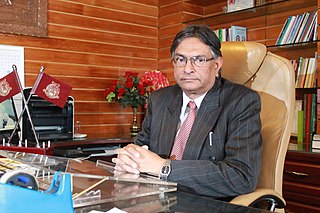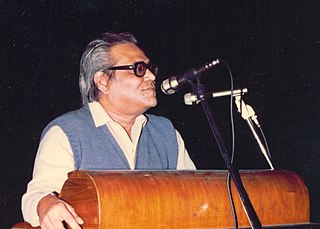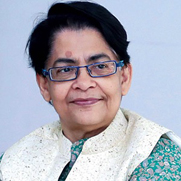Related Research Articles

Entamoeba is a genus of Amoebozoa found as internal parasites or commensals of animals. In 1875, Fedor Lösch described the first proven case of amoebic dysentery in St. Petersburg, Russia. He referred to the amoeba he observed microscopically as Amoeba coli; however, it is not clear whether he was using this as a descriptive term or intended it as a formal taxonomic name. The genus Entamoeba was defined by Casagrandi and Barbagallo for the species Entamoeba coli, which is known to be a commensal organism. Lösch's organism was renamed Entamoeba histolytica by Fritz Schaudinn in 1903; he later died, in 1906, from a self-inflicted infection when studying this amoeba. For a time during the first half of the 20th century the entire genus Entamoeba was transferred to Endamoeba, a genus of amoebas infecting invertebrates about which little is known. This move was reversed by the International Commission on Zoological Nomenclature in the late 1950s, and Entamoeba has stayed 'stable' ever since.

Entamoeba histolytica is an anaerobic parasitic amoebozoan, part of the genus Entamoeba. Predominantly infecting humans and other primates causing amoebiasis, E. histolytica is estimated to infect about 35-50 million people worldwide. E. histolytica infection is estimated to kill more than 55,000 people each year. Previously, it was thought that 10% of the world population was infected, but these figures predate the recognition that at least 90% of these infections were due to a second species, E. dispar. Mammals such as dogs and cats can become infected transiently, but are not thought to contribute significantly to transmission.

Maxine Frank Singer is an American molecular biologist and science administrator. She is known for her contributions to solving the genetic code, her role in the ethical and regulatory debates on recombinant DNA techniques, and her leadership of Carnegie Institution of Washington. In 2002, Discover magazine recognized her as one of the 50 most important women in science.

Talat Ahmad is an Indian Earth Scientist, former Professor at the Department of Geology, University of Delhi and served as Indian National Science Academy (INSA) Senior Scientist. He served as Chairman of Governing body which oversees Wadia Institute of Himalayan Geology, Dehradun from 1 December 2021 and served the office till 30 November 2027. Previously, he commenced his second stint as vice chancellor of University of Kashmir on 6 August 2018 and served the office till 20 May 2022. Before that, he served as Vice chancellor of Jamia Millia Islamia, he resigned from the post a few months short of his full term. He was shortlisted by a committee constituted by the governor to shortlist a panel for the post. He had earlier taken over as Vice-chancellor of University of Kashmir from Professor Riyaz Punjabi on 1 June 2011. Prior to this, he was teaching Geology at the University of Delhi.
Tania A. Baker is an American biochemist who is a Professor of Biology at the Massachusetts Institute of Technology and formally the head of the Department of Biology. She earned her B.S. in Biochemistry from University of Wisconsin–Madison and her Ph.D. in Biochemistry from Stanford University under the guidance of Arthur Kornberg. She joined the MIT faculty in 1992 and her research is focused on the mechanisms and regulation of DNA transposition and protein chaperones. She is a member of the National Academy of Sciences, fellow of the American Academy of Arts and Sciences, and has been a Howard Hughes Medical Institute (HHMI) investigator since 1994.
Usha Vijayraghavan is an Indian molecular biologist. She is on the faculty of the Department of Microbiology and Cell Biology, at the Indian Institute of Science. Her major research interests are Molecular Genetics, Plant Development.
B K Thelma commonly known as Bittianda Kuttapa Thelma is a professor in the Department of Genetics at the University of Delhi, South Campus, New Delhi, India. She is the Principal investigator and Co-ordinator of the Centre of excellence on Genomes Sciences and Predictive Medicine funded by the Govt. of India. She is also the Co-ordinator of a major project on newborn screening for inborn errors of metabolism in Delhi state which aims to demonstrate the feasibility of mandatory screening of newborns in the country and to generate epidemiological data for the testable IEMs in the genetically distinct Indian population, for the first time.
Veena Krishnaji Parnaik is an Indian cell biologist and the current Chief Scientist at the Centre for Cellular and Molecular Biology. She obtained her Masters in Science in medicinal biochemistry from the University of Mumbai and received her PhD from Ohio State University before moving back to India to work at the CCMB. Her research is focused on understanding the functional role of the nuclear lamina and how defects in it may lead to disorders such as progeria and muscular dystrophy.
Gaiti Hasan is an Indian scientist who researches in the fields of molecular biology, genetics, neuroscience and cell signalling. Hasan is a Fellow of the Indian National Science Academy (INSA), the apex body of Indian scientists and technologists. From 2013 onwards she has been serving as a Senior Professor at the National Centre for Biological Sciences (NCBS), Bangalore.
Virander Singh Chauhan is an Indian scientist and a Rhodes Scholar working in the fields of genetic engineering and biotechnology. He is known for his contributions to the development of a recombinant vaccine for malaria. and for synthetic structural peptides with biological functions. He was honored by the Government of India in 2012 with the fourth highest Indian civilian award of Padma Shri. He is the present Chancellor of the Gandhi Institute of Technology and Management.
Asis Datta is an Indian biochemist, molecular biologist and genetic engineer, known for his research on genetically modified foods and food nutritional security. He was the founding Director of the National Institute of Plant Genome Research and is credited with the discovery of genes that assist in extended preservation of fruits and vegetables. He is a recipient of the Shanti Swarup Bhatnagar Award, the highest Indian award and in the Science category, and was awarded the fourth highest civilian award of the Padma Shri, by the Government of India, in 1999. In 2008, he was included again in the Republic Day Honours list for the third highest civilian honour of the Padma Bhushan.

Amar Nath Bhaduri was an Indian molecular enzymologist and chemical biologist, known for his studies on UDP-glucose 4-epimerase, a homodimeric epimerase found in cells and his work on Leishmania donovani, the protozoal pathogen for Kala-azar. He was the director of the Indian Institute of Chemical Biology (IICB), Kolkata and an elected fellow of the Indian National Science Academy and the Indian Academy of Sciences. The Council of Scientific and Industrial Research, the apex agency of the Government of India for scientific research, awarded him the Shanti Swarup Bhatnagar Prize for Science and Technology, one of the highest Indian science awards, in 1978, for his contributions to biological sciences.

Subhash Chandra Lakhotia is an Indian cytogeneticist, academic, Distinguished Professor of Zoology, and the Science & Engineering Research Board (SERB) Distinguished Fellow at the Banaras Hindu University. He is known for his pioneering research on Drosophila with regard to its chromosome organization and replication. A Raja Ramanna fellow of the Department of Science and Technology and the Department of Atomic Energy, he is an elected fellow of all three major Indian science academies: Indian National Science Academy, Indian Academy of Sciences and National Academy of Sciences, India. He is a Senior Fellow of the Cell Stress Society International (USA). The Council of Scientific and Industrial Research, the apex agency of the Government of India for scientific research, awarded him the Shanti Swarup Bhatnagar Prize for Science and Technology, one of the highest Indian science awards, in 1989, for his contributions to biological sciences.
Alok Bhattacharya is an Indian parasitologist, academic and a professor at the School of Life Sciences of the Jawaharlal Nehru University. He chairs the Biotechnology Information System Network (BITSNET) as well as the Life Sciences Expert Committee of FIST program of the Department of Science and Technology (DST). He is an elected fellow of the Indian Academy of Sciences and the Indian National Science Academy and is known for his studies on Entamoeba histolytica and species-specific calcium binding protein and its gene.
Suman Kumar Dhar is an Indian molecular biologist and a professor at the Special Centre for Molecular Medicine of Jawaharlal Nehru University. He is known for his studies on the DNA replication and cell cycle regulation in Helicobacter pylori and Plasmodium falciparum, two pathogens affecting humans. An elected fellow of the National Academy of Sciences, India, Indian National Science Academy and the Indian Academy of Sciences, he is also a recipient of the National Bioscience Award for Career Development of the Department of Biotechnology in 2010. The Council of Scientific and Industrial Research, the apex agency of the Government of India for scientific research, awarded him the Shanti Swarup Bhatnagar Prize for Science and Technology, one of the highest Indian science awards, in 2012, for his contributions to biological sciences.
Yagya Dutta Sharma is an Indian molecular biologist, professor and head of the department of biotechnology at the All India Institute of Medical Sciences, Delhi. An elected fellow of all three major Indian science academies — Indian National Science Academy, Indian Academy of Sciences, and National Academy of Sciences, India — Sharma is known for his research on the molecular biology of malaria. The Council of Scientific and Industrial Research, the apex agency of the Government of India for scientific research, awarded him the Shanti Swarup Bhatnagar Prize for Science and Technology for his contributions to medical sciences in 1994.
Subrat Kumar Panda is an Indian virologist, professor and Head Department of Pathology at All India Institute of Medical Sciences, Delhi. Known for his researches in viral hepatitis, Panda is an elected fellow of the Indian Academy of Sciences, Indian National Science Academy and the National Academy of Medical Sciences. The Council of Scientific and Industrial Research, the apex agency of the Government of India for scientific research, awarded him the Shanti Swarup Bhatnagar Prize for Science and Technology, one of the highest Indian science awards for his contributions to Medical Sciences in 1995.
Vijay Kumar is an Indian molecular biologist, virologist and an honorary scientist at the International Centre for Genetic Engineering and Biotechnology. Known for his research in hepatology, Kumar is an elected fellow of National Academy of Sciences, India, National Academy of Medical Sciences, and National Academy of Agricultural Sciences as well as a J. C. Bose National Fellow of the Department of Biotechnology. The Council of Scientific and Industrial Research, the apex agency of the Government of India for scientific research, awarded him the Shanti Swarup Bhatnagar Prize for Science and Technology, one of the highest Indian science awards for his contributions to Medical Sciences in 1997.
Ranjan Sen is an Indian microbiologist, biophysicist and a senior scientist as well as the head of the Laboratory of Transcription at the Centre for DNA Fingerprinting and Diagnostics. Known for his studies in the field of prokaryotic transcription, Sen is an elected fellow of the Indian National Science Academy and the National Academy of Sciences, India. The Department of Biotechnology of the Government of India awarded him the National Bioscience Award for Career Development, one of the highest Indian science awards, for his contributions to biosciences in 2007.

Chandrima Shaha is an Indian biologist. As of September 2021, she is the J. C. Bose Chair Distinguished Professor at the Indian Institute of Chemical Biology, Kolkata. She is the former Director and former Professor of Eminence at the National Institute of Immunology. She was the President of Indian National Science Academy (2020–22) and the Vice President of the same academy (2016–2018). She is an elected fellow of the World Academy of Sciences, Indian National Science Academy, Indian Academy of Sciences, National Academy of Sciences and the West Bengal Academy of Science and Technology.
References
- 1 2 3 4 "INSA profile on Dr. Bhattacharya" . Retrieved 29 August 2016.
- ↑ "Bhattacharya, Prof. Sudha Fellow profile" . Retrieved 15 March 2014.
- 1 2 3 4 5 6 "Dr. Bhattacharya's JNU faculty profile". Archived from the original on 18 January 2017. Retrieved 29 August 2016.
- ↑ "Faculty - Sudha Bhattacharya".
- ↑ "Prof.Sudha Bhattacharya". www.jnu.ac.in. Retrieved 8 December 2019.
- ↑ "INSA :: Indian Fellow Detail". insaindia.res.in. Retrieved 8 December 2019.